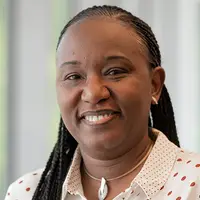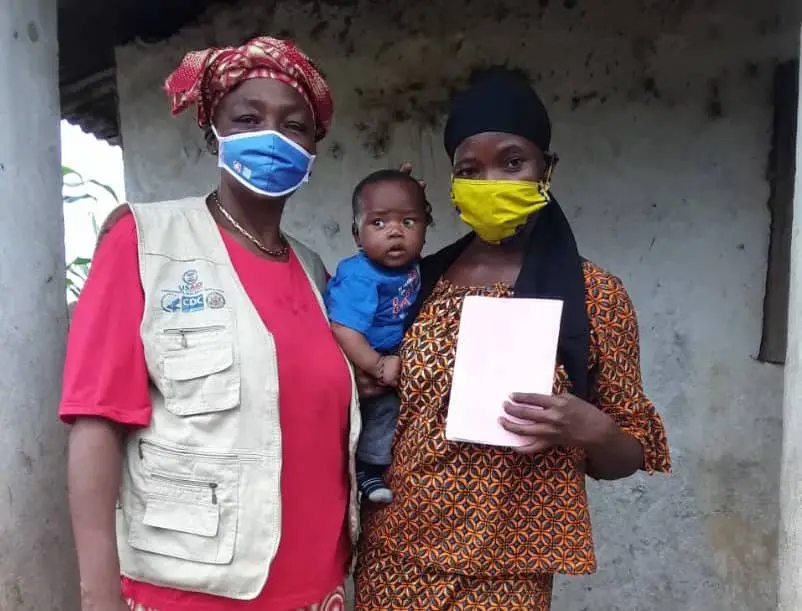Forecariah, Guinea – Odette (left) poses with a woman that she provided malaria prevention services to throughout her pregnancy. Thanks to access to these services, the woman and her baby are malaria-free. Credit: USAID StopPalu+ project
Odette Tolno is a community health worker who is passionate about protecting women and their families from malaria in her home country of Guinea. She travels from community to community organizing home visits to reach women that might not have access to malaria information or services. She, like her fellow health workers, is an essential piece of the puzzle in reaching hard-to-reach communities. During a typical home visit, she tests individuals for fever, provides treatment, and verifies that pregnant women are attending their recommended antenatal care appointments, and if necessary accompanies them to the health center. After women deliver their babies, the work doesn’t stop there – Odette also follows up to ensure that the newborn receives their free bednet and vaccine.
Women like Odette are at the heart of work to end malaria, but women are also some of the most adversely affected by this disease. Pregnant women in particular are highly susceptible to malaria infection due to a lowered immune response during pregnancy – adverse effects for both mom and baby range from maternal anemia to low birth-weight and even loss of the fetus. To put this into perspective, the World Health Organization reports that in 2018 there were an estimated 11 million pregnant women infected with malaria in moderate and high transmission areas in Sub-Saharan Africa, resulting in almost 900,000 children born with low birth-weight.
In Guinea, women and girls also face gender and cultural norms that affect their exposure to malaria and ability to access malaria prevention and treatment services. For example, gender-specific norms dictate that women are responsible for all domestic duties and caregiving, including often playing a significant role in unpaid farming to feed their families. This means that women may be at particular risk for mosquito bites when they wake before dawn to perform household chores. Once sick, custom dictates they ask their husbands’ permission to seek care, which can make accessing treatment for malaria difficult. According to the 2018 Guinea Demographic and Health Survey, 59% of women report having sole decision-making power in their own health care and 28% reported joint decision making.
It is clear that gender equality and work to end malaria are intertwined – understanding the gender dynamics in prevention and treatment of malaria will ultimately help reach women and girls with the health services they need to thrive.
Reaching Women and Girls with Malaria Treatment & Prevention
We are working to understand and address these dynamics in Guinea through the USAID Stop Palu+ project, with funding from the U.S. President's Malaria Initiative. In partnership with the National Malaria Control Program (NMCP), we recently developed a gender strategy as an approach to integrating gender within malaria control activities to reduce malaria-related mortality and morbidity. This strategy was informed primarily by the USAID/GUINEA CDCS 2020 Gender Analysis, focus group discussions conducted by StopPalu+ in August of 2019, and consultations with stakeholders during the course of the project.
Here are a few key examples from the strategy of how we are integrating gender approaches into a range of malaria control interventions to improve health outcomes in Guinea.
- Organizing routine insecticide-treated net (ITN) distribution in weekly markets to serve groups who may not have systematic access to health services, including migratory populations. Due to the long distances between health facilities and households as well as the lack of transportation and cost constraints, most women come to town once a week on the market day. Therefore this is often the best moment to reach them and provide them with bednets to protect them and their families from malaria.
- Coordinating with local and community groups (e.g., women and men’s groups, youth leaders, organizations led by people with disabilities, etc.) to identify and reach marginalized women and children living in hard-to-reach areas. For example, StopPalu+ organizes mobile clinics and community outreach activities in partnership with community groups to provide malaria tests and treatment, antenatal care, immunizations, and bednets in order to improve access to care.
- Meeting pregnant women where they are to ensure they adhere to intermittent preventative treatments to protect themselves and their fetus from malaria. For example, StopPalu+ organizes monthly community outreach activities in areas that are easy for women to access, working with health centers, providers, and community health workers to ensure women who face challenges to accessing care are provided with the essential health services they need.
In addition to these considerations, we believe it is critical to include gender-sensitive measurement across data collection methods, recognizing dynamics and accessibility to participatory and equitable methods (e.g. consulting women at times convenient to them) and engaging a range of data collectors to reduce the risk of power dynamics, negative gender norms, and cultural issues that could hinder evidence gathering. A gender learning agenda should also be incorporated to answer key gender-related questions and understand expected and unintended outcomes.
Using interventions like the ones listed above will ensure that women are better able to receive life-saving prevention, diagnosis, and treatment for malaria and enable community health workers like Odette to seize opportunities for greater gender integration within their day-to-day activities.


